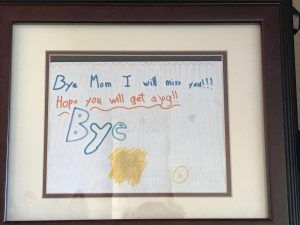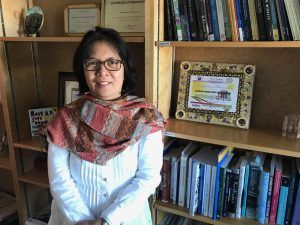Connection and community – two elements that guide long-time Women & Gender Studies professor, Dr. Glenda Bonifacio. Creating a better world around her and leading by example, Glenda brings the type of warmth and approachability to a room that you can’t help but engage with and be enthralled by.
“I came to interview at the University of Lethbridge in 2005 after living and working in Ontario. My interview here was the first of three I had lined-up, but the only one that was based at a Canadian post-secondary institution. Given that my family and I had just moved to Canada fairly recently, our preference was to stay in our new homeland and luckily, the U of L wanted to keep it that way, too.
“Before my interview, one of my daughters drew me a little good luck note. When she gave it to me, she also let me know that she hoped I got the job because she wanted to stop moving and have the same friends for a while. It wasn’t until that moment that I really realized that while my husband and I had been trying to find a better life for our family, our kids were wanting that same feeling, too. I keep that drawing in a frame in my office to remind me of beginnings and how it felt to find this community for our family.

“I have five daughters, so I like to joke that I have my own Women & Gender Studies class at home! Two of my daughters are current students, two are alumni and one studied at another institution. We have a strong connection to this university and this city. I love Lethbridge for its small size and the beautiful landscape we’re situated in. While you may not be able to find the exact resource you’re looking for in a city of this size, the best part is that you can almost, always create it for yourself. A good example of would be a recently formed support group here on campus. With support from diverse colleagues, we recently formed SNAC+ or the Support Network for Academics of Colour+ to work towards equity, inclusion and belonging for students, staff and faculty.
“I’m a member of a few community groups but one I’m especially passionate about is ReadWorld Foundation. After the super typhoon, Haiyan, in the Philippines, I was made aware that schools in the disaster affected areas had lost entire libraries. Education is truly the great equalizer and so in poorer areas, the fallout of having no educational materials is dealing a devastating blow to the already vulnerable student population at the elementary, high school and university levels. ReadWorld Foundation collects book donations and school supplies, and then raises money to send them to poor and disaster-affected areas. There’s no bureaucracy that gets in the way, the books leave our storage garage, get loaded onto a container ship and then get distributed directly to the schools in need.
“There are so many areas of study involved in Women & Gender Studies that I like to say it’s one of the pillars of liberal education and interdisciplinary studies. Our work takes into account so many different perspectives and areas of focus. The sciences, philosophy, political science, arts, management, for example, are integrated in our subject areas. My colleagues, students and I really get the best of all of these worlds and it’s evolving everyday. This means that my classes are never the same. Each year the text, the conversations and the discourse around concepts are different. It makes for exciting and interesting work because you are seeing change happen right in front of you.

“In every class I teach and in every interaction I have, I try to instill that you may not be able to change the world, but you can make it better for those around you. The concepts and lessons gained at university are what help to shape you as a person. If we can show students how they can be better global citizens and effect change locally, hopefully they’ll continue the practice throughout their lives.”